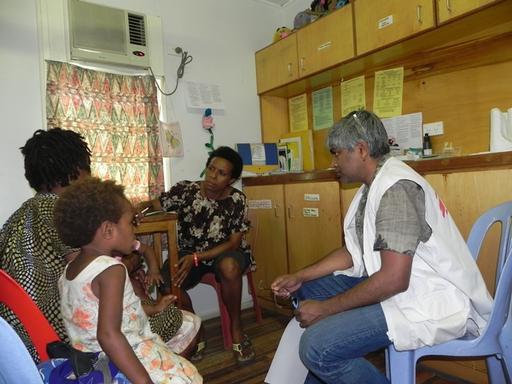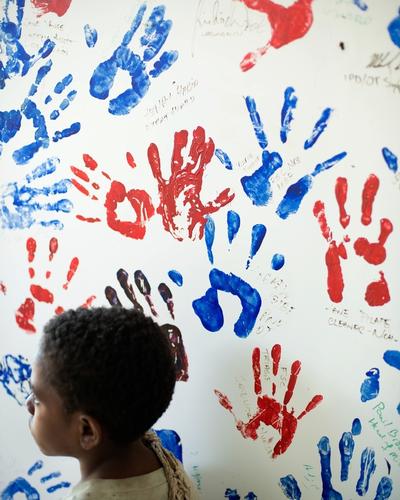Traversing the seas off the coast of Papua New Guinea’s Gulf Province can be treacherous. For around five months a year, the South East trade winds – the Laura Bada - regularly howl at around 30 knots per hour, whipping up a huge chop and ensuring many of the small open boats used in these parts remain mostly moored.
While the province is not completely isolated during those months - it lies over 300 kilometres to the west of the capital Port Moresby - it is remote. Mountainous, covered by lush forests, bisected by rivers and tributaries, it is barely served by roads.
It’s largely a land without Land Cruisers, the four-wheeled Toyota workhorses often used by MSF in operations across the world. Which provides just one challenge, of many, here: how to access and treat patients in the tuberculosis (TB) programme that has been running since May 2014, ensuring that a population with a high burden of TB and increasing cases of Drug Resistant TB can receive the necessary treatment and follow-up care.
‘’It’s a place where we have to think differently,” says Tokyo-based Dr Isaac Chikwanha, MSF Deputy Programme Manager and Medical Advisor for Papua New Guinea.
From the ways to deliver sputum samples for diagnostic tests from remote areas – UAVs were trialled last year – and how treatment is administered, to simply accessing patients, that different thinking is manifesting itself in numerous ways.
But outreach is key. Around 85% of PNG’s population live in rural areas, and the majority of Gulf Province’s 158,000 or so residents live in diffuse communities, each spread over a few miles.
“In Kerema we have a cohort of over 200 patients from three facilities, but not much idea what’s happening in the rest of the province, because of access,” says Chikwanha. “So the problem could be much bigger.”
In late August an outreach expedition was undertaken from Kerema to the town of Ihu, to explore the potential of a largely overland route from Kerema to the nine basic medical facilities in that area of the province, otherwise practically inaccessible during the Laura Bada.
It’s a three-day journey, involving day-long hikes through forests and crossing rivers. It’s better than no access at all, but maybe not the long-term sustainable solution for MSF teams that over the past 12 months identified 22 DR-TB patients in Kerema alone. Those same patients would otherwise have to take the same journey to Kerema for treatment.
MSF began its (TB) program in Gulf Province in May 2014, working closely with the National Department of Health and the National Health Program. A similar programme has been running in National Capital District. It is the top infectious disease in terms of hospital admissions. But first those patients need to be able to access a health facility.
In terms of treatment, among those who are detected in Kerema the clinical process can take six months or up to two years for DRTB.
“Of course initially patients who are told to take treatment for some the reaction is in a negative way. There is a high stigma still to have TB, but by far and away what is happening is mostly good,” says Philomena Tatireta, MSF Assistant Medical Coordinator, who prior to joining MSF was working at AGNAU Memorial Hospital in Lae.
“This not an ‘emergency project,’ it’s in its first moments really and there remain lots of challenges from the logistical to geographic,” she says.
It’s not just following up diagnosed patients that better access in the province is essential – currently, for every three patients that return to the Out Patient Department in Kerema General Hospital, one does not. It’s to reach those who may need to be screened, strengthen community education aspects of TB programme - that it is fatal but treatable - and make sure that local communities feel they can accept, trust and rely on MSF.
Community cultures and languages - over 800 in the country are diverse and tribal identities remain high meaning neighbouring communities can have quite different attitudes to diseases like TB, from a medical understanding to more traditional and even magical.
It’s a programme in its infancy then but one that MSF and the Ministry of Health are committed to. Patients might not always be lining up at health facilities as they might in places with better infrastructure, so in some ways there needs to be a different approach from MSF staff.
Risako Inoue worked for two months in Papua New Guinea, large parts of it in Kerema, working as a pharmacist.
For her it felt like a normal mission, with previous MSF field experience in South Sudan and Malawi, but quickly saw that it’s going to be a long process. “If I had 6 months leave I'd choose PNG again,” she said talking from Tokyo where she’s now working at one of the city’s hospitals.
“You can’t treat it quickly. (For expats) you need someone who knows a long mission or those who have experience in dealing with TB or HIV programmes in their home countries.”
In a young project there are difficulties and challenges but they can all be overcome.
“To be honest, the fact that MSF are trying to help my people is what keeps me going,” says Tatireta. “They’ve taken the first step to help in the Gulf province which has really been neglected for so long.”
MSF has two TB programmes in Papua New Guinea, in Gulf Province that began in May 2015, and in National Capital District that began in March 2015.





